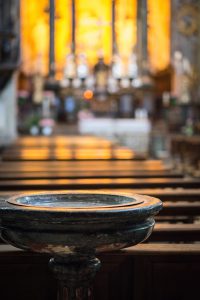
Stained glass window depicting Christ’s baptism by John the Baptist. St Luke’s Catholic Church St Louis Park Minnesota USA
By Tish Harrison Warren-
I wake slowly. Even when the day demands I rally quickly – when my kids leap on top of me with sharp elbows or my alarm blares – I lie still for the first few seconds of the day, stunned, orienting, thoughts dulled. Then comes, slowly, the dawning of plans to make and goals for the day. But in those first delicate seconds, the bleary-eyed pause of waking, before the tasks begin, before I get on my game, I’m greeted again with the truth of who I am in my most basic self.
Whether we’re children or heads of state, we sit in our pajamas for a moment, yawning, with messy hair and bad breath, unproductive, groping toward the day. Soon we’ll get buttoned up into our identities: mothers, business people, students, friends, citizens. We’ll spend our day conservative or liberal, rich or poor, earnest or cynical, fun-loving or serious. But as we first emerge from sleep, we are nothing but human, unimpressive, vulnerable, newly born into the day, blinking as our pupils adjust to light and our brains emerge into consciousness.
I always try to stay in bed longer. My body is greedy for sleep – “Just a few more minutes!”
But it’s not just sleep I’m greedy for – it’s that in-between place, liminal consciousness, where I’m cozy, not quite alert to the demands that await me. I don’t want to face the warring, big and small, that lies ahead of me today. I don’t want to don an identity yet. I want to stay in the womb of my covers a little longer.
To be beloved
It’s remarkable that when the Father declares at Jesus’ baptism, “This is my beloved Son, with whom I am well pleased.” Jesus hasn’t yet done much of anything that many would find impressive. He hasn’t yet healed anyone or resisted Satan in the wilderness.
He hasn’t yet been crucified or resurrected. It would make more sense if the Father’s proud announcement came after something grand and glorious – the triumphant moment after feeding a multitude or the big reveal after Lazarus is raised.
But after hearing about Jesus’ birth and a brief story about his boyhood, we find him again as a grown man at the banks of the Jordan. He’s one in a crowd, squinting in the sun, sand gritty between his toes.
The one who is worthy of worship, glory, and fanfare spent decades in obscurity and ordinariness. As if the incarnation itself is not mind-bending enough, the incarnate God spent his days quietly, a man who went to work, got sleepy, and lived a pedestrian life among average people.
Jesus emerges from water a commoner, wet and messy haired. And suddenly the Spirit of God shows up and the deep mystery of the universe reverberates through the air: this is the Son of God, the Son the Father loves, in whom he is pleased.
Jesus is sent first to the desert and then into his public ministry. But he is sent out with a declaration of the Father’s love.
Jesus is eternally beloved by the Father. His every activity unfurls from his identity as the Beloved. He loved others, healed others, preached, taught, rebuked, and redeemed not in order to gain the Father’s approval, but out of his rooted certainty in the Father’s love.
The wet grace of baptism

Baptism is the first word of grace spoken over us by the church. In my tradition, Anglicanism, we baptize infants. Before they cognitively understand the story of Christ, before they can affirm a creed, before they can sit up, use the bathroom, or contribute significantly to the work of the church, grace is spoken over them and they are accepted as part of us. They are counted as God’s people before they have anything to show for themselves.
When my daughters were baptized, we had a big celebration with cupcakes and champagne. Together with our community we sang “Jesus Loves Me” over the newly baptized. It was a proclamation: before you know it, before you doubt it, before you confess it, before you can sing it yourself, you are beloved by God, not by your effort but because of what Christ has done on your behalf. We are weak, but he is strong.
In many liturgical churches baptismal fonts are situated at the back of the sanctuary. As people walk into church to worship, they pass by it. This symbolizes how baptism is the entrance into the people of God. It reminds us that before we begin to worship – before we even sit down in church – we are marked as people who belong to Jesus by grace alone, swept up into good news, which we received as a gift from God and from believers who went before us.
As worshipers enter the sanctuary and pass the font, they dip their fingers in it and make the sign of the cross. They do this as an act of recollection – remembering their own baptism and recalling that they are loved and approved of because of Jesus’ work. When my eldest daughter was very young, barely able to walk, I’d lift her up to the baptismal font at the entrance of our sanctuary and let her touch the water. I’d whisper, “Remember your baptism.” She didn’t yet know the words of the liturgy or the theology of sacraments but this visceral experience – the hard basin of the font, the cool water on her fingers – was her entrance into worship.
According to Lutheran theologian Martin Marty, Lutherans are taught to begin each day, first thing, by making the sign of the cross as a token of their baptism. In her book Receiving the Day: Christian Practices for Opening the Gift of Time, Dorothy Bass explains this practice: “For all Christians, baptism embodies release from yesterday’s sin and receipt of tomorrow’s promise: going under the water, the old self is buried in the death of Christ; rising from the water the self is new, joined to the resurrected Christ.” Martin Luther charged each member of his community to regard baptism “as the daily garment which he is to wear all the time.”
We enter each new day as we enter the sanctuary, by remembering our baptism. Each morning Marty crosses himself – what he calls his “non-verbal prayer.” He remembers again that he is forgiven for all that has come before and that there will be grace enough for all that lies ahead.
I was baptized in a little Baptist church in a small town in Texas when I was about six years old. I don’t remember much about it. I remember – at least I think I remember – the odd feeling of my long robe billowing in warm water; I remember enjoying all the hugging and attention from grownups afterward, and being thrilled that I could now drink grape juice in church; and I remember the photographs I’ve seen in an old album of a tiny me with wet hair and a squinty smile in front of a short brick building with a steeple.
But by “remembering our baptism,” I do not mean that we must literally recall historic details of an event in our life, which I personally can barely remember. Instead, I recall that one Sunday morning, as I was plunged under water “in the name of the Father, Son, and Holy Spirit,” I was marked. In the Anglican baptismal liturgy, we tell the newly baptized that they are “sealed by the Holy Spirit in baptism and marked as Christ’s own for ever.” Galatians tells us that we are clothed in Christ in baptism (Galatians 3:27), clothed in the Beloved Son in whom the Father is well pleased. To use Paul’s more chilling image, on that day as a six-year-old, I died and was buried, and then, reversing the whole order of the universe, newly born with Christ (Romans 6:3-5).
As Christians, we wake each morning as those who are baptized. We are united with Christ and the approval of the Father is spoken over us. We are marked from our first waking moment by an identity that is given to us by grace: an identity that is deeper and more real than any other identity we will don that day.
My wet fingers dipped in the baptismal font remind me that everything I do in the liturgy – all the confessing and singing, kneeling and peace passing, distraction, boredom, ecstasy, devotion – is a response to God’s work and God’s initiation. And before we begin the liturgies of our day – the cooking, sitting in traffic, emailing, accomplishing, working, resting – we begin beloved. My works and worship don’t earn a thing. Instead, they flow from God’s love, gift, and work on my behalf. I am not primarily defined by my abilities or marital status or how I vote or my successes or failures or fame or obscurity, but as one who is sealed in the Holy Spirit, hidden in Christ, and beloved by the Father. My naked self is one who is baptized.
This reality seeps out of my soul quickly. Days can pass in a bluster of busyness, impatience, and distraction. I work to build my own blessedness, to strive for a self-made belovedness. But each morning in those first tender moments – in simply being God’s smelly, sleepy beloved – I again receive grace, life, and faith as a gift. Grace is a mystery and the joyful scandal of the universe.
Tish Harrison Warren is a priest in the Anglican Church in North America, serving as co-associate rector at Church of the Ascension in Pittsburgh, Pennsylvania. She writes regularly for The Well, Her.meneutics, and Christianity Today. This excerpt is taken with permission from her book Liturgy of the Ordinary: Sacred Practices in Everyday Life (InterVarsity).





0 Comments